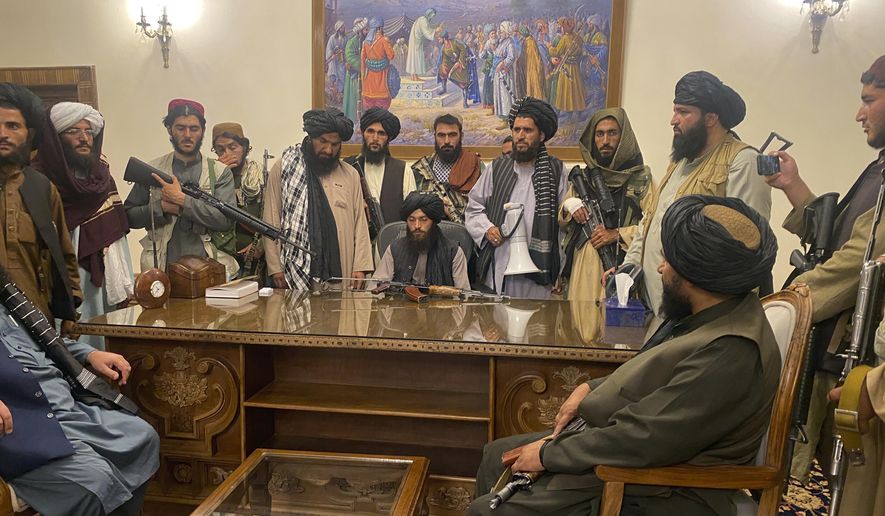OPINION:
On the day the United States marked two decades since the 9/11 terrorist attacks, the Taliban triumphantly hoisted their flag over the Afghan presidential palace and launched their new regime in a brief ceremony. The unprecedented 9/11 attacks prompted the U.S. not only to invade landlocked, strategically located Afghanistan but also to launch a global war on terror. But now, the U.S. has come full circle by handing Afghanistan to the same terrorists responsible for 9/11.
President Joe Biden’s historic blunder in facilitating the terrorist takeover of Afghanistan has highlighted how the U.S.-led war on terror has gone astray. Over the past 20 years, the scourge of international terrorism has spread deeper and wider in the world.
Mr. Biden has earned his place in history by making the world’s deadliest terrorists — the Pakistan-reared Taliban, who killed more than 2,000 American soldiers since 2001 — great again. Historians will be flummoxed that the U.S. expended considerable blood and treasure in a protracted war to ultimately help its enemy ride triumphantly back to power.
The humiliating rout of the world’s mightiest power represents the greatest victory of violent Islamists in the modern history of jihadism, with the Taliban calling it “the most joyful day of our existence.” The triumph over the “Great Satan” is certain to inspire other Islamist and terrorist groups worldwide.
Undeterred by his Afghan disaster, Mr. Biden plans to withdraw from Iraq this year, in keeping with what he declared in his August 31 address to the nation: “This decision about Afghanistan is not just about Afghanistan. It’s about ending an era of major military operations to remake other countries.” This readjustment of strategic objectives is already rattling allies — from Taiwan to Ukraine — who fear being abandoned the way the U.S. threw the Afghan government under the bus.
Afghanistan indeed may not be the last blunder of the Biden presidency. Robert Gates, who served as defense secretary under presidents George W. Bush and Barack Obama, wrote in 2014 that Biden “has been wrong on nearly every major foreign policy and national security issue over the past four decades.” Gates has proved right.
In fact, al-Qaeda leader Osama bin Laden, in a May 2010 letter found in his Pakistan compound after U.S. forces killed him, advised al-Qaeda not to target then-Vice President Biden, in the hope that he would one day become president. “Biden is totally unprepared for that post, which will lead the U.S. into a crisis,” bin Laden wrote. He, too, has proved correct.
Mr. Biden has ignored the lessons of 9/11. This is apparent from the administration’s outreach to the Taliban. Mr. Biden has attempted to paint the Taliban as “good” terrorists and ISIS-K, al-Qaeda, and the Haqqani Network as “bad” terrorists. He even claimed that “ISIS-K terrorists” are “sworn enemies of the Taliban,” ignoring the Pentagon’s acknowledgment that it was the victorious Taliban that freed thousands of ISIS-K prisoners.
Like the administration’s attempt to portray the new Taliban as more enlightened than the old Taliban, Mr. Biden’s specious distinctions between “good” and “bad” terrorists have been part of his public-relations campaign to soften the blow from his handover of mineral-rich Afghanistan to an Islamist militia that is a wing of the Pakistani “deep state.” Indeed, extending its good-terrorists-versus-bad-terrorists hypothesis, Team Biden has sought to court the Taliban as America’s new partner to help contain the “bad” militants, with Secretary of State Antony Blinken saying publicly that the U.S. is ready to work on “counterterrorism” with the Taliban.
A key 9/11 lesson was that the viper reared against one state is a viper against others. Drawing distinctions between those who threaten U.S. security and those who threaten others is a sure recipe for counterterrorism failure, as terrorist cells and networks must be targeted wherever they exist on a sustained basis to achieve enduring results against the forces of global jihad.
Team Biden is intentionally ignoring the fact that the Taliban are closely entwined with other terror groups. A recent United Nations Security Council report said, “the Taliban and al-Qaida remain closely aligned” and cooperate through the Haqqani Network. The triumphant Taliban have not only refused to utter a critical word about al-Qaeda but also now claim there is “no proof” that bin Laden was responsible for 9/11.
The Taliban and the Haqqani Network are not “two separate entities,” as the State Department claimed, but closely integrated, as the lineup of the new Cabinet ministers in Kabul shows. And, although Biden sought to insulate the Taliban from the Aug. 26 Kabul Airport bombing by quickly pinning the blame on ISIS-K, the fact is that ISIS-K has little relationship with the ISIS founded by Abu Bakr al-Baghdadi. Rather, as part of Pakistani intelligence’s deception operations to build plausible deniability in terror attacks, ISIS-K draws its cadres largely from the Taliban’s special forces — the Haqqani Network.
The world today is reaping the bitter fruits of a geopolitics-driven war on terror, which, in the global imagination, has become associated with U.S. surveillance excesses, torture, renditions, and regime-change military interventions. Afghanistan is set to become a haven for international terrorists under a regime stacked with U.N.-listed or U.S.-designated terrorists, including the prime minister, who was instrumental in the 2001 destruction of two giant, sixth-century Buddhas in Bamiyan.
America’s Afghan defeat, drenched in the blood of betrayal, resulted from ignoring the lessons of 9/11, including the importance of not coddling states that bankroll or sponsor transnational terrorism. And the U.S.-led war on terror, instead of containing terrorism, has generated greater international insecurity. It is not too late for the U.S. to absorb the lessons from national policies that gave rise to Frankenstein’s monsters.
• Brahma Chellaney is a geostrategist and the author of nine books, including the award-winning “Water: Asia’s New Battleground” (Georgetown University Press).




Please read our comment policy before commenting.